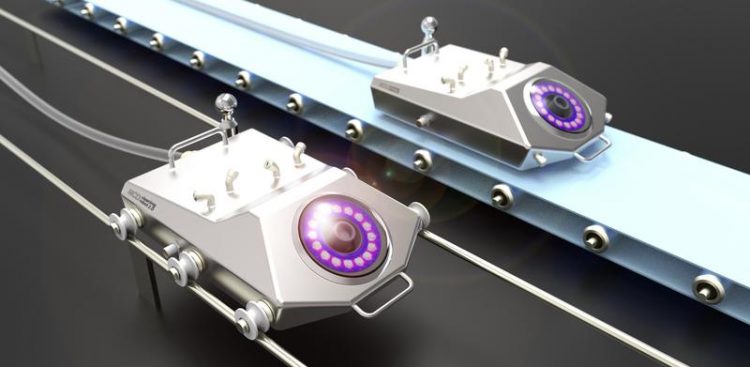Fraunhofer IVV Dresden presents new systems for improving process efficiency at interpack 2017

Two variants of the Mobile Cleaning Device: self-driven or on conveyor belt Fraunhofer IVV Dresden
Versatile and mobile – the new device for cleaning processing machinery
A new mobile device has been developed by the Fraunhofer IVV Dresden to facilitate the cleaning of processing machinery. The showcase “Mobile Cleaning Device” (MCD) brings together the benefits of traditional automated cleaning systems and the versatility of manual cleaning.
The MCD has an optical sensor system for dirt detection and adaptive cleaning. What areas are dirty and need cleaning? When is the cleaning finished? Was it successful? In the future these questions will be able to be answered using inline sensor systems.
The virtual twin of the MCD comprises an adaptive model of the cleaning process. Combining this with cognitive control concepts and the sensor system for dirt detection allows for the first time adaptive cleaning, namely cleaning adapted to the hygienic state of the machinery. The flexibility of the system is also evident in the drive concept.
Movement between machine modules can take place via an own drive unit or by utilizing existing transport systems such as conveyor belts. In contrast to standard cleaning systems, the MCD is not installed in a dedicated way in a machine, rather it can be used in a versatile way to clean several machines. Separately driven nozzles are available for foam and spray cleaning. Besides the cleaning of whole machines, the targeted cleaning of parts of a machine is also possible.
Self-learning assistance system improves machine efficiency
The Fraunhofer IVV Dresden is actively developing self-learning assistance systems for processing machinery and will present the first concepts at interpack 2017. The decisive factor for starting the development work was recognition that even the most advanced production lines are prone to often short faults/stoppages every five minutes on average.
Processes and machinery are becoming ever more complex. Many production line operators are thus unable to remedy faults at their source, and so only manage to alleviate the short-term effects. Even highly advanced sensor systems are not always able to prevent faults, for example those caused by fluctuating product properties.
The most important source of knowledge for remedying machine faults is the knowledge of experienced, qualified machine operators. In order for this knowledge to be passed down to less experienced personnel, the Fraunhofer IVV Dresden is pursuing various concepts for providing operators with information about fault elimination relevant for the prevailing conditions.
These concepts have now been brought together in SAM, the self-learning assistance system for machines, which helps operators remedy faults via a quasi navigation system. A foundation for this is anomaly detection in patterns of sensor signal based on the techniques of data mining and machine learning. Future steps will develop a cooperative dialog system. This will allow the assistance system to learn directly from the operator and together propose a problem-solving strategy, without the SAM itself actively engaging in the production process.
Media Contact
More Information:
https://www.ivv.fraunhofer.de/All latest news from the category: Trade Fair News
Newest articles

High-energy-density aqueous battery based on halogen multi-electron transfer
Traditional non-aqueous lithium-ion batteries have a high energy density, but their safety is compromised due to the flammable organic electrolytes they utilize. Aqueous batteries use water as the solvent for…

First-ever combined heart pump and pig kidney transplant
…gives new hope to patient with terminal illness. Surgeons at NYU Langone Health performed the first-ever combined mechanical heart pump and gene-edited pig kidney transplant surgery in a 54-year-old woman…

Biophysics: Testing how well biomarkers work
LMU researchers have developed a method to determine how reliably target proteins can be labeled using super-resolution fluorescence microscopy. Modern microscopy techniques make it possible to examine the inner workings…





















